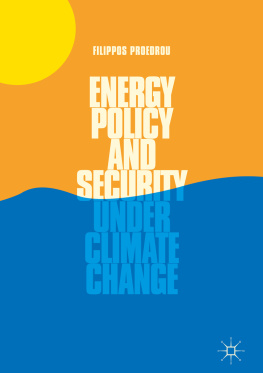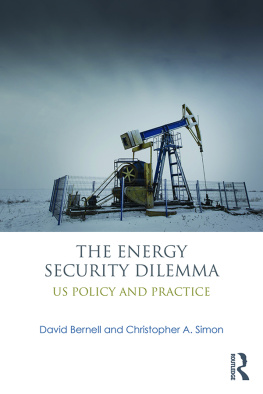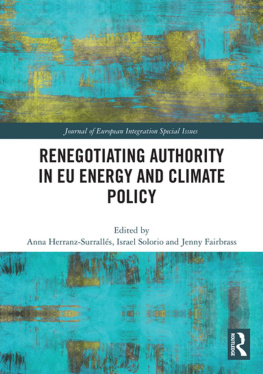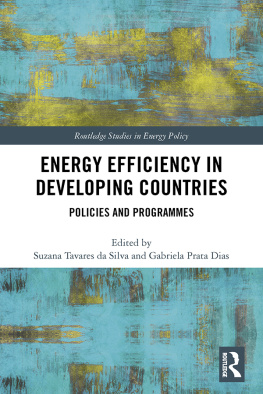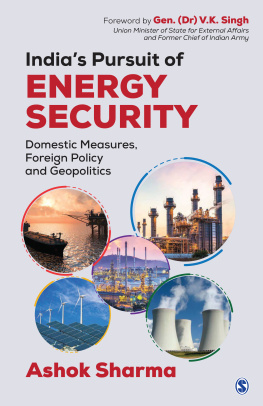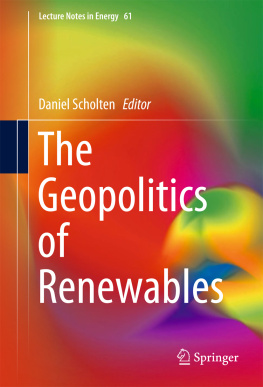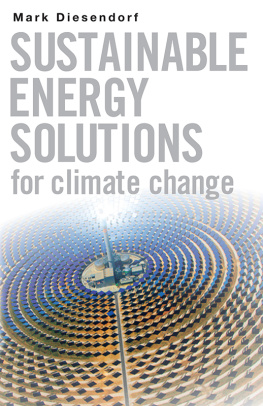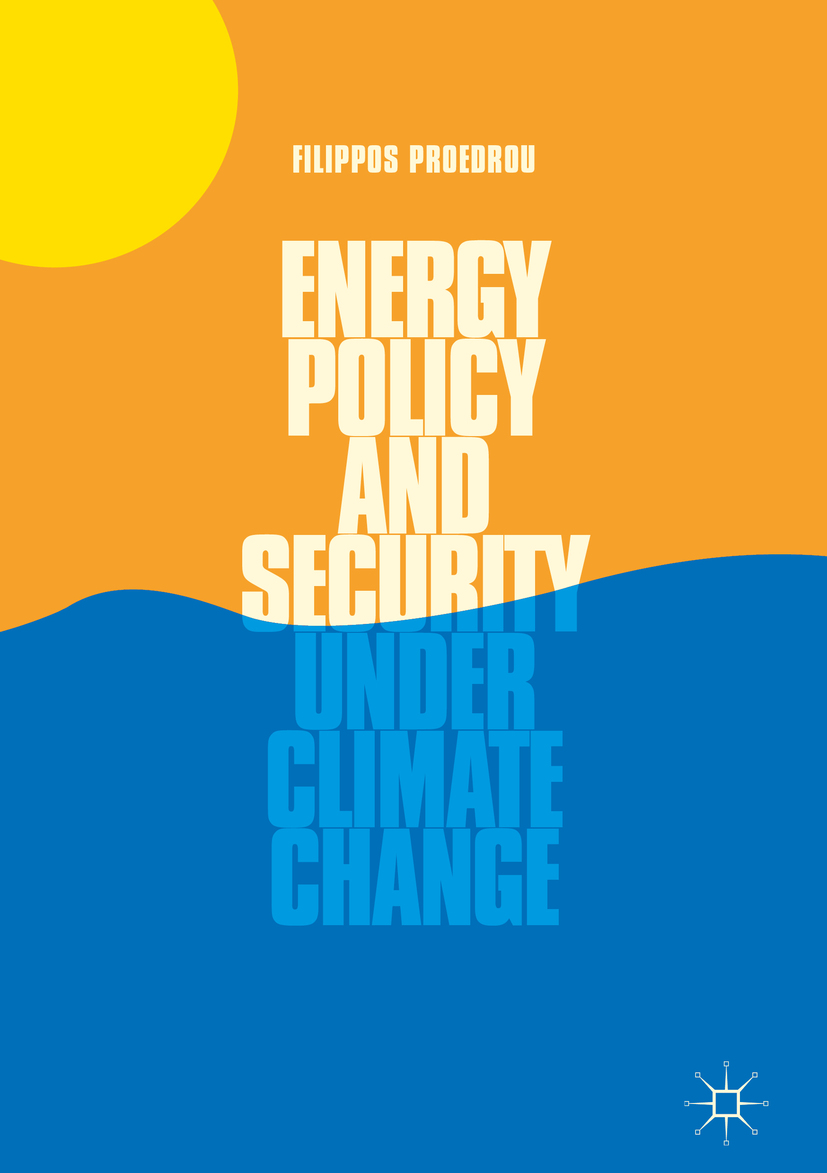Filippos Proedrou
Energy Policy and Security under Climate Change
Filippos Proedrou
University of South Wales, Cardiff, UK
ISBN 978-3-319-77163-2 e-ISBN 978-3-319-77164-9
https://doi.org/10.1007/978-3-319-77164-9
Library of Congress Control Number: 2018936607
The Editor(s) (if applicable) and The Author(s) 2018
This work is subject to copyright. All rights are solely and exclusively licensed by the Publisher, whether the whole or part of the material is concerned, specifically the rights of translation, reprinting, reuse of illustrations, recitation, broadcasting, reproduction on microfilms or in any other physical way, and transmission or information storage and retrieval, electronic adaptation, computer software, or by similar or dissimilar methodology now known or hereafter developed.
The use of general descriptive names, registered names, trademarks, service marks, etc. in this publication does not imply, even in the absence of a specific statement, that such names are exempt from the relevant protective laws and regulations and therefore free for general use.
The publisher, the authors, and the editors are safe to assume that the advice and information in this book are believed to be true and accurate at the date of publication. Neither the publisher nor the authors or the editors give a warranty, express or implied, with respect to the material contained herein or for any errors or omissions that may have been made. The publisher remains neutral with regard to jurisdictional claims in published maps and institutional affiliations.
Cover design: Akihiro Nakayama
This Palgrave Macmillan imprint is published by the registered company Springer International Publishing AG part of Springer Nature.
The registered company address is: Gewerbestrasse 11, 6330 Cham, Switzerland
To my little sunshine, Anastasia, and to Maria for all her love and support.
List of Abbreviations
AMI
Advanced Metering Infrastructure
CCS
Carbon Capture and Storage
COP21
2015 United Nations Climate Change Conference in Paris
ETS
Emissions Trading System
EU
European Union
FIPs
Feed-in Premiums
FITs
Feed-in Tariffs
GDP
Gross Domestic Product
GPI
Genuine Progress Indicator
IEA
International Energy Agency
IPCC
Intergovernmental Panel for Climate Change
ISEW
Index of Sustainable Economic Welfare
ISIS
The Islamic State in Iraq and Syria
NAFTA
North American Free Trade Agreement
OPEC
The Organization of Petroleum Exporting Countries
ppm
parts per million
ROCs
Renewables Obligation Certificates
UNFCCC
United Nations Framework Convention on Climate Change
UNSDGs
United Nations Sustainable Development Goals
WTO
World Trade Organization
List of Tables
Table 3.1 Centralized versus decentralized energy systems
Table 3.2 Steady-state versus mainstream low carbon energy policy
Table 4.1 Energy security in the steady-state and mainstream energy policy framework
Table 5.1 Geopolitics and development in the steady-state and mainstream energy policy framework
The Author(s) 2018
Filippos Proedrou Energy Policy and Security under Climate Change https://doi.org/10.1007/978-3-319-77164-9_1
1. Introduction
Filippos Proedrou
(1)
University of South Wales, Cardiff, UK
Climate Change Comes of Age
Humanity finds itself at a critical crossroads . Based on the mainstream scientific consensus, humanity is faced with multiple existential threats. It is reaching critical planetary limits in domains such as global freshwater use and ocean acidification, rate of biodiversity loss, land-system change, stratospheric ozone depletion, and growth across all indices of starving resources (Zimmerer : 1109).
Framing the issue macroscopically, humanity survived due to conducive conditions throughout the Holocene, the geological period dated to 11,000 years ago. We entered the most recent phase, Anthropocene, 250 years ago. Anthropocene is characterized by the reversal of a symbiotic relationship between humans and the ecosystem following the Industrial Revolution, and the end of the slow and peaceful utilization of the latters resources for the formers survival and welfare. The Intergovernmental Panel on Climate Change () has issued five assessment reports, in which significant probability has given way to certainty regarding the anthropogenic nature of climate change.
At inception, climate change was viewed principally as a technical issue assigned to specialized institutions and framed in equally scientific terms. These initial formulations unraveled as the scope of threat presented by climate change came into focus. Given biophysical framings of climate impacts and ecosystems vulnerability, it is now recognized that vulnerability to climate change properly extends to the socioeconomic and political conditions that affect how communities cope with the impacts of climate-related hazards (Mason : 164).
As the initial speculation wanedalong with overt denial and skepticismthe understanding of climate change graduated to widespread acquiescence of the bold fact that the climate has entered a phase of transformation that works to the detriment of human existence. There are three main reasons why this has happened in the course of the last two decades. Firstly, science itself has generated compelling evidence on the validity of the initial hypothesis. Accordingly, the burden of proof has moved to the opposite camp, which has failed to wage a persuasive campaign. Secondly, and related to the above, ecological transformations are producing powerful visible effects of climate change impact, now and into the future. Thirdly, there has been a significantalbeit far from universalshift in entrepreneurial mood and concomitant growing acceptance of economic convergence with climate change. There is ample space for innovation and plenty corporate opportunities in green capitalism, which more and more economic actors are eager to seize upon, especially given tense competition in saturated economic sectors that drives the need for diversification of business portfolios. This economic convergence has facilitated a more favorable understanding of the challenge and enabled responses to it (Beck and Van Loon : 11721).
The main culprit behind climate change has been the extensive use of fossil fuels . Climate change mitigation has hence been cast largely as one of changing the energy systems of contemporary society away from fossil fuel-based systems towards low- or no-carbon systems (Steffen : 193).
Although pressure for more comprehensive climate policy becomes critical for the future of energy globally (Dubash and Florini : 23).
Overall, responses to climate changepractical efforts to bring emissions down to sustainable levelshave been greatly conditioned by mainstream understandings of and workings within the global political economy, the global political system, and domestic political contours. After exploring these interactions in the next three sections, this introductory chapter moves on to expose the prevailing inconsistencies plaguing responses to climate change. The analysis then broaches the implicit trilemma between climate change mitigation, energy security and growth that drives the politics of climate change mitigation. Against this backdrop, the book sets out an alternative model of energy transition that breaks from the growth imperative tied to the traditional prisms of energy security , geopolitics and development .

